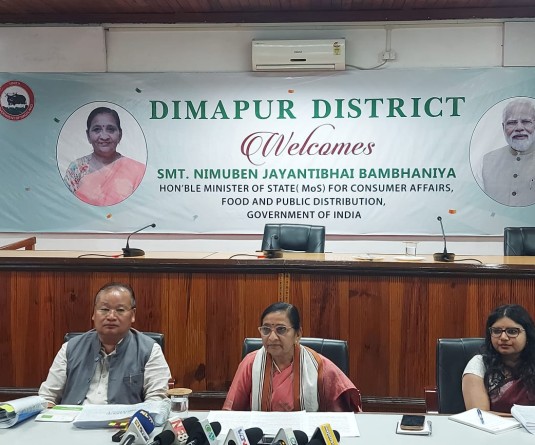Department of Economics, Zunheboto Government College, in collaboration with IQAC, hosted a seminar on on November 1.

Zunheboto, November 2 (MExN): The Department of Economics, Zunheboto Government College, in collaboration with the Internal Quality Assurance Cell (IQAC), hosted a significant one-day seminar on “Emerging Trends in Nagaland Economy” on November 1. The event brought together students, faculty, and local entrepreneurs to discuss pressing economic issues and potential pathways for growth, stated a press release received here.
The seminar was chaired by Tonoli S Awomi, Assistant Professor, Department of Economics. In her opening remarks, she underscored the importance of fostering discussions around the economic landscape of Nagaland, which is facing numerous challenges.
Dr T Zarenthung Ezung, Professor, Department of Economics, Nagaland University presented a stark analysis of Nagaland's economic trajectory, noting a dramatic increase in revenue from Rs 339.95 crore in 2012 to Rs 16587.3 crore in 2024. However, he cautioned that despite this growth, the state remains heavily dependent on central government support, which poses significant risks to its economic stability.
Dr Ezung identified several key challenges that Nagaland faces in its quest for economic self-sufficienc. On poor infrastructure, he emphasised the need for improved road connectivity, which is essential for economic activities and access to markets.
On underdeveloped agriculture, Dr Ezung lamented that agricultural practices remain largely focused on subsistence rather than commercial viability, limiting income generation. On the lack of industrial development, he pointed out the minimal presence of industries, questioning the efficacy of existing ones, such as the local sugar mill, which has fallen into decline.
He also criticized the state’s short-term focus on initiatives like oil palm cultivation, arguing for a shift towards tapping into more sustainable resources such as coal and limestone. Additionally, he highlighted the importance of the tourism sector, noting the absence of a robust travel agency framework and the need for diversification beyond the Hornbill Festival.
On corruption and political unity, Dr Ezung addressed the pervasive issue of corruption, calling for a cultural shift in attitudes towards donations and political practices. He pointed out that societal norms often tolerate unethical behavior, which stifles genuine progress. He emphasised the need for unity among the various factions within Nagaland to combat these issues and work towards a common economic goal.
The seminar featured insights from several resources person, each bringing unique perspectives on the economic landscape of Nagaland.
Esther Angami, Supervisor of Training and Placement at YouthNet, spoke on the economic plight of daily wage workers, who collectively earn approximately Rs 22 crore annually. She noted the lack of entrepreneurial spirit and work culture among the youth, urging them to take advantage of various government schemes designed to enhance skills in hospitality, tourism, and technology.
Lanchung Panmei, Proprietor of SB3 Coating Nagaland, shared his entrepreneurial journey and the importance of digital marketing in growing his business. He stressed the need for aspiring entrepreneurs to build strong customer relationships and seek financial support through loans, particularly from government schemes like MUDRA loans.
Kileto I Chishi, Assistant Professor at Zunheboto Government College, highlighted the pressing issue of youth unemployment, which stands at 27% as of September 2023. He emphasized the necessity for skill development in trades such as plumbing, electrical work, and tailoring, encouraging local vendors to engage in income-generating activities.
Elito G Kibami, Deputy Manager of SBI Zunheboto, addressed the challenges of accessing loans for young entrepreneurs, highlighting the lack of financial literacy within the community. She called for innovative approaches beyond traditional retail, advocating for investments in agriculture and allied sectors.
The seminar concluded with a vote of thanks from Dr Bolivi S Kiba, Head of the Department of Economic Department, Zunheboto Government College. The seminar was attended by 18 faculties and 53 students.





